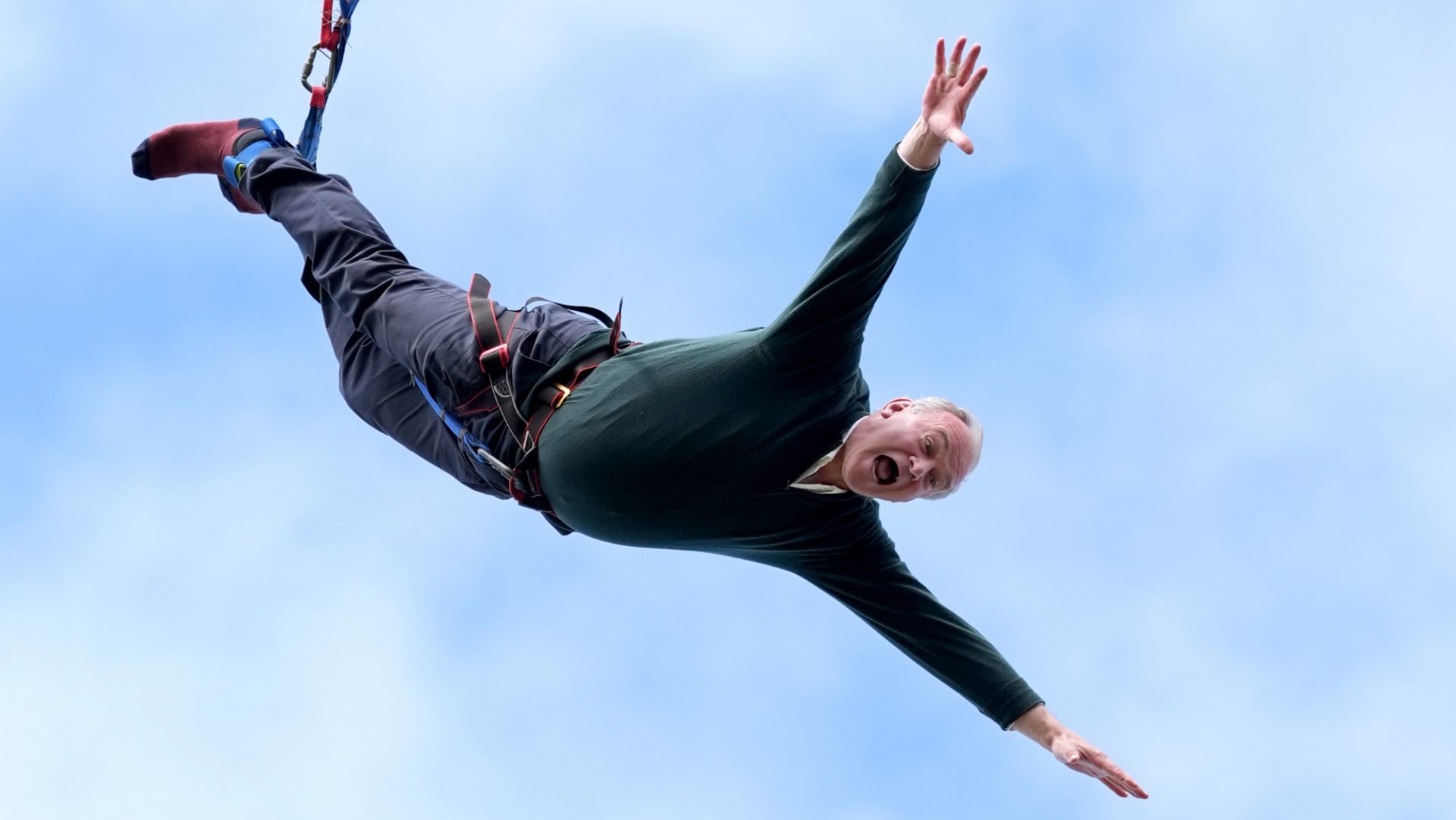One photograph of Ed Miliband looking ridiculous has haunted the former Labour leader for the best part of a decade of his life.
Over the last six weeks alone, Liberal Democrat leader Ed Davey has been photographed gurning, gasping, yelping, pratfalling and falling over – many, many times – over the course of just six weeks, and it’s been almost universally hailed as a triumph.
While Keir Starmer and Rishi Sunak ran intensely choreographed election campaigns, surrounded almost entirely by the party faithful and never the public, Davey’s team put him in ridiculous situation after ridiculous situation. He rode the slip and slide, multiple rollercoasters, paddle-boarded and abseiled his way through to election day.
It might have looked more like a schoolchild’s dream summer than anyone’s idea of a general election campaign, but the results are undeniable: the Liberal Democrats have gone from winning just 11 seats in 2019 to holding 72 now.
That is more than six seats for each one the party previously held, and is 10 more than the Liberal Democrats had won in any election – a record which was set in 2005 by Charlie Kennedy, not by Nick Clegg in 2010.
For all that 2010’s general election was dominated by “Cleggmania”, the Lib Dems actually lost five seats in that election, even if they did go on to enter government. The other time Lib Dems felt there was momentum behind a popular leader – Jo Swinson in the 2019 general election – that leader went on to humiliatingly lose their seat.
Ed Davey, then, has broken something of a curse for the party, in which it would secure initially glowing coverage during an election and then completely fail to transfer that into winning seats. What was different this time for Ed Davey and the party he leads?
The ascendency of Davey was certainly not a foregone conclusion. Davey had not cut through to the public, or even to much of the Westminster bubble before the election was called. With the Liberal Democrats fourth in terms of seats, and holding just 11, the party had few platforms in day-to-day politics from which to garner attention – no regular slot at Prime Minister’s Questions, and no power to influence legislation given the huge Tory majority.
Davey himself was something of a problematic figure for the Lib Dems, who are often a party of protest. While Davey would try to position himself as the best-placed man to oppose the Conservatives, it was inescapable that he had served as a cabinet minister in the Conservative-led government – meaning some of the Tories he was opposing had been his government colleagues.
Trickier still, Davey had been the minister overseeing the Post Office for at least one period of the multi-year scandal over the prosecutions of sub-postmasters, turning an issue that might have been a brilliant attack line for the party into one it largely had to duck and stay away from. Between this and a perceived lack of charisma for Davey, the Lib Dems were largely out of sight and out of mind pre-election.
One bright spot for the party and for Davey was the party’s immensely well-regarded by-election operation. Smaller parties like the Lib Dems can struggle in a national election, where they are not just crowded out for coverage by the bigger parties, but where their relatively limited resources are stretched.
By-elections equalise the playing field, and the Lib Dems have enjoyed a longstanding reputation for doing them well. There were no fewer than 28 by-elections in the 2019-2024 parliament, 19 of which resulted in a seat changing hands – and the Lib Dems picked up four of those. While that might not seem initially all that impressive, for a party that started on just 11 seats, it represented a significant increase to the size of the parliamentary bloc.
More importantly, those by-election operations let the Lib Dem ground campaign team hone their messages. The operation behind Ed Davey, more than the man himself, deserves credit for this bit: Lib Dem president Mark Pack and chief exec Mike Dixon ran an incredibly disciplined series of campaigns.
While other parties – most notably the Conservatives – had to look in multiple directions to hold or win their seats, in their case at Labour and at Reform, the Lib Dems all but exclusively targeted Conservative seats, and chose those carefully. Knowing that this would be their general election strategy allowed the party to use by-elections as a chance to test their messaging, see what worked, and junk everything that didn’t. The Lib Dems had a plan and they stuck to it.
Ridiculous as the party’s stunts might have looked – which was often pretty damn ridiculous – they were not some happy accident. The party had hit on visual stunts long ago as one of the few ways to get coverage given the Lib Dems were vanishingly unlikely to have a role in the next government.
By at least providing some visuals and a bit of relatively light relief, the Lib Dems knew that a broadcaster editor looking for a bit of “fluff” to fill some time, or a newspaper editor wanting a good picture to liven up a page, might look towards them.
Lib Dem staffers seem willing to be ruthless in what they’ll put their leader through – accounts have suggested that on occasion Davey would only find out what he’d be going through when he was safely in a vehicle and on his way there.
The stunts were not new for this general election. What elevated them this time was a willingness from Davey and those around him to break something of a barrier around his personal life and to show his role – and that of his family – serving as a carer for his disabled son.
Not only was this profoundly humanising for a leader many voters wouldn’t have heard of, or thought much about – Davey’s love and care for his son was immediately apparent for even a casual viewer – but it gave Davey authority to talk about care, an issue of profound importance to millions of people across the country, whether it is their own care, or that of a child, parent or partner.
The pieces thus clicked into place, and people “got it”: get some attention with flashy visuals, and demonstrate that you understand life can be fun while you’re at it (often missing from politics), but then have something meaningful to say afterwards. Davey gave the Lib Dems a focus during the national campaign to back up their notoriously good ground game in their target seats.
If the Lib Dems had a discontented flank in the way that Labour does, they could easily pick at Davey’s success just as the hard left had attacked Starmer’s: despite winning just 11 seats and losing her own, Jo Swinson secured 3.7 million votes for the Lib Dems in 2019. By contrast, Ed Davey picked up just 3.5 million in 2024. If anything, the Lib Dem shift from piling up votes to piling up seats is even more profound than that of the Labour Party.
That tendency within the Lib Dems doesn’t really exist – generally the party is just delighted that it’s in a place where it might get noticed again – but the difference between 2019 and 2024’s votes and seats is almost the identical story to Labour’s, but in an even more dramatic way for the Lib Dems.
In 2019, the party seemed to get a little high on its own supply. With talk of how unpopular Jeremy Corbyn was and polls seeming to suggest a majority of the public would support a second EU referendum, coverage got giddy – with suggestions the Lib Dems might even win more seats than Labour. The party seemed to spread itself thinly, targeting Labour seats as well as Tory, seeing if big wins might be possible.
Something similar happened in 2024, albeit with more basis and a vastly closer result, around the suggestion the Lib Dems might overtake the Tories. Had Labour’s vote share been two or three points higher, this actually could have happened.
But crucially, the Lib Dems stuck to the plan and to their target seats – around 50-60 seats, almost all Tory held and in southern England. It won nearly every single one of them. The stars aligned: the party got just enough hype to have a good story to tell nationally, but not so much that it threw caution to the wind and overreached.
There is always luck as well as judgment in big victories: Reform splitting the Conservative vote while peeling even fewer voters from the Lib Dems than it did from Labour – thanks to their stance as the most pro-EU national party – fuelled at least some of the Lib Dem wins.
Going from 11 to 72 seats was a phenomenal achievement, but finding the next 50 seats to target while holding on to the ones it has is yet another step up in difficulty. Politics is a cruel mistress: success tends to bring with it challenges even more insurmountable than the ones you just surpassed.
But for now, Davey and the Lib Dems can at least celebrate what they’ve done. They’ve built their leader’s profile, won a satisfying number of seats, and as much of a place in the national debate as an opposition party can when the government has a landslide majority.
For once, people might actually be looking for what they’ll do next with genuine interest.




